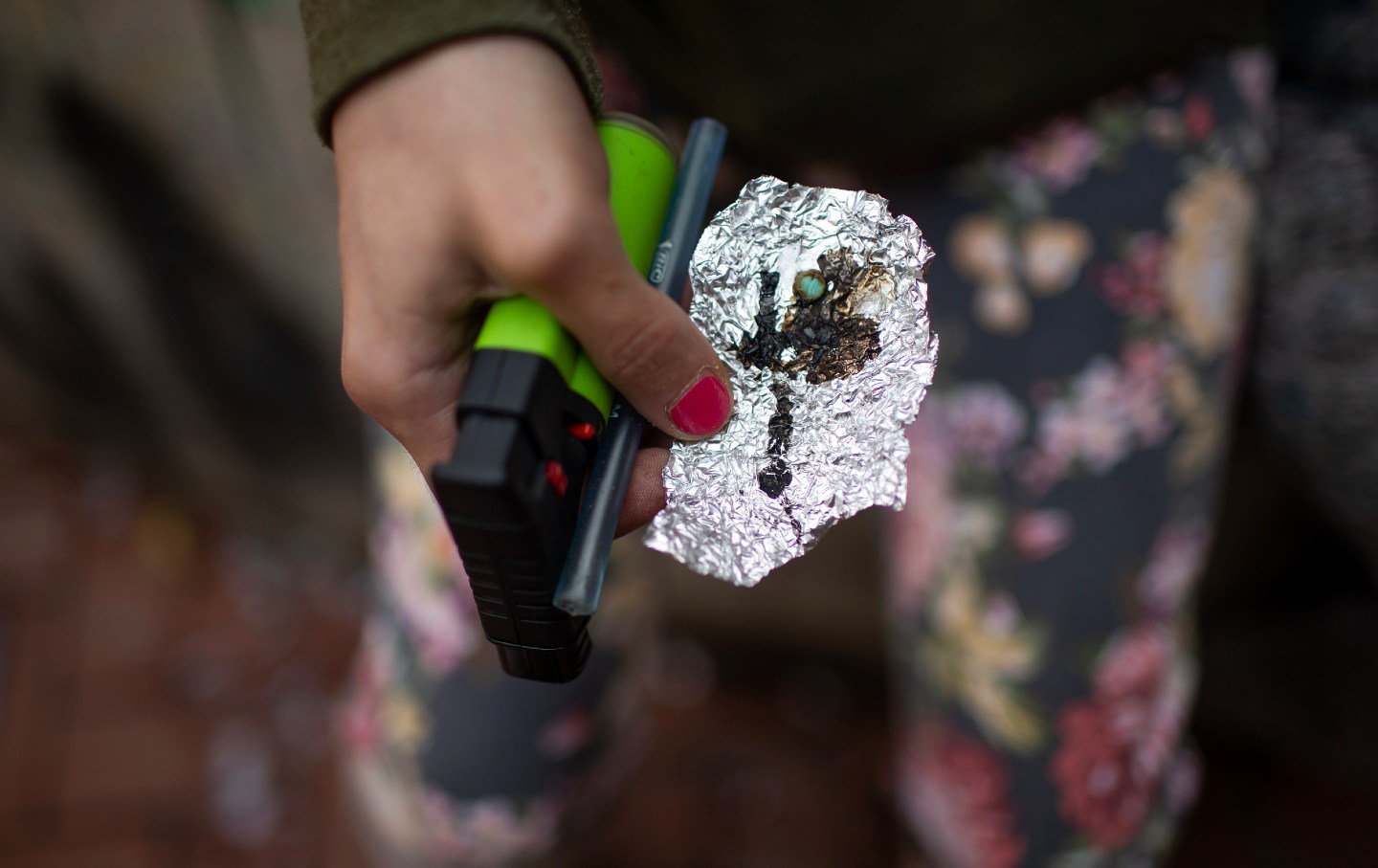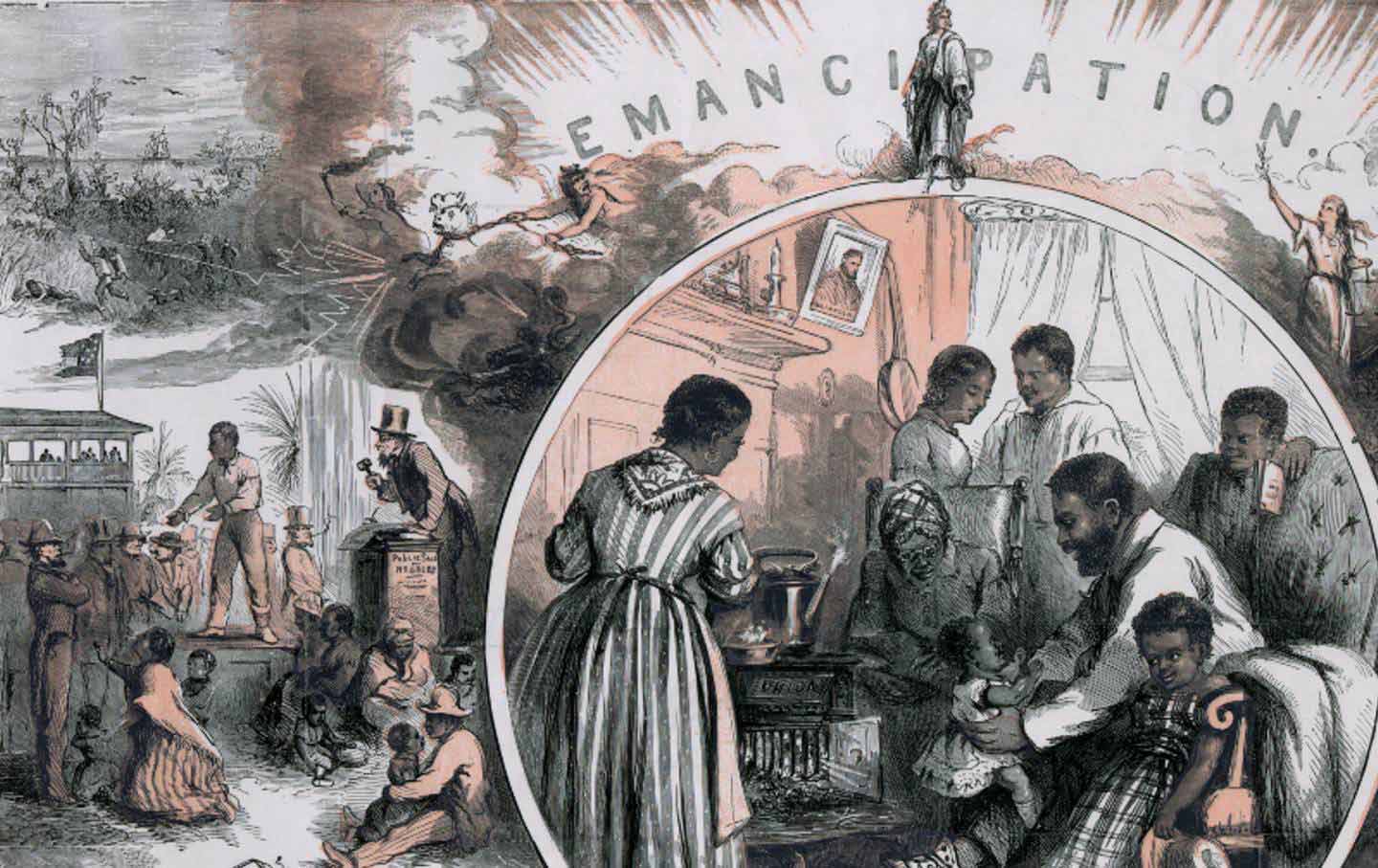We Need to Modify—Not Trash—Oregon’s Trailblazing Drug Decriminalization Law
Measure 110 made Oregon the first in country to decriminalize all drugs. The law was poorly implemented and should be changed, not discarded.

A person holds drug paraphernalia near the Washington Center building on SW Washington St. in downtown Portland, Ore., on April 4, 2023.
(Dave Killen / The Oregonian via AP)As 2023 winds down, perhaps the West Coast’s most innovative—and controversial—public policy experiment is on life support.
Three years ago, amid the public health crisis of the pandemic and increases in drug usage, Oregon voters passed Ballot Measure 110, the Drug Addiction Treatment and Recovery Act, with 58 percent voting in favor. The law decriminalized personal possession of all categories of drugs, making the state the first in the country to remove law enforcement from the equation around hard drug usage.
Advocates argued that it would free up money for treatment and social-service interventions—the measure allocated upwards of $260 million from tax revenues on legal marijuana to treatment and addiction services—and would end the criminalization of poor, disproportionately minority residents. It was sold as a win-win for commonsense criminal-justice reform and, in the wake of George Floyd’s murder and the protests that grew out of that horrific event, as a step forward for racial justice.
The results didn’t quite work out the way proponents had hoped. In the last three years, the number of fatal drug overdoses in Portland soared. In 2021, alone, 41 percent more Oregonians died of fatal fentanyl overdoses than died in 2020. The steep upward trajectory continued over the succeeding two years as well. In 2023, nearly one in every 500 visits to emergency rooms and urgent care centers in the state were due to opioid overdoses, almost double the rate in 2019.
And, while advocates argue that the spike in deaths occurred before most of BM 110’s provisions kicked in, the public, looking at the nexus of crime, homelessness, a spiraling mental health crisis playing out in public view, and rampant on-the-streets drug usage—all of which were driving businesses, tourists, and convention organizers from the center of Portland—has rapidly soured on the policy reform. Their concerns have been backed up by some studies that show that the legalization of hard-drug possession can be linked to nearly 25 percent of the overdose deaths the state was seeing.
Many local governments also came out against the measure, arguing that, without adequate backstopping from the state, it was forcing them to divert dollars from their general funds into services to treat a soaring number of addicts. (It’s difficult to determine whether this was because the measure had created more addicts or if existing addicts were finally getting the services they needed and should have been provided with long ago.) A state audit found that it took the Oregon Health Authority two years after passage of BM 110 before all counties in the state had received at least some state funds for the increased treatment infrastructure that the measure mandated. In the intervening two years, counties had been left largely on their own.
With the troubled rollout of BM 110 and its treatment provisions, the public’s patience wore thin. By this past summer, nearly two-thirds of the state’s voters told pollsters they wanted to significantly modify the reform.
Not surprisingly, Oregon’s political and business leaders have gotten on board the anti–BM 110 train. This past September, two voter initiatives were filed that would ban the use of hard drugs in certain public locales; recriminalize possession of a number of drugs, including methamphetamine, heroin, and fentanyl; and mandate treatment for those with substance abuse issues instead of simply suggesting it. The initiatives, which will be voted on in 2024, are backed by an array of high-profile business leaders, including Nike founder and philanthropist Phil Knight.
Also, this past September, the Portland City Council unanimously voted in favor of an open-use drug ban. Those who continue to use drugs in public spaces can be fined or sentenced to jail.
Now, a growing number of legislators are putting public pressure on Governor Tina Kotek to call a special legislative session to address Oregon’s addiction crisis and to push for reforms to BM 110. And Kotek herself has, in recent months, repeatedly talked about the need to modify the ballot measure. (In a similar move, California Governor Gavin Newsom, reading the political tea leaves last year, vetoed a bill that would have created safe-use, supervised drug injection sites in several Californian cities. And earlier this year, Washington Governor Jay Inslee backed away from legalizing the possession of hard drugs.)
It’s hard to see how BM 110, its support corroded even among many of the groups that initially supported it, survives intact going into the 2024 election season. What comes next—whether it’s a good-faith modification of the law that keeps the principle of dealing with addiction as a public health issue rather than primarily as a law enforcement one, or a wholesale dismantling of all its key parts and a reversion to the War on Drugs model—will shape how progressive communities respond to the fentanyl catastrophe for years to come.
Turning the ship of state at least moderately against the failed, cruel, and calamitously expensive War on Drugs policies of the 1980s, 1990s, and early 2000s—policies that locked up huge numbers of low-end drug offenders, often for years and decades at a stretch—has been one of the great achievements of criminal justice reformers in recent years. That something of a consensus has been reached among politicians from across the fractious ideological divides of modern politics is nothing short of a political miracle. But it’s a fragile accomplishment. Oregon’s Ballot Measure 110 was a poorly thought-out and even more poorly implemented policy. In the accelerating backlash against it, by a mostly liberal electorate, there is a real risk that vitally important changes will also get trashed.
We cannot back down
We now confront a second Trump presidency.
There’s not a moment to lose. We must harness our fears, our grief, and yes, our anger, to resist the dangerous policies Donald Trump will unleash on our country. We rededicate ourselves to our role as journalists and writers of principle and conscience.
Today, we also steel ourselves for the fight ahead. It will demand a fearless spirit, an informed mind, wise analysis, and humane resistance. We face the enactment of Project 2025, a far-right supreme court, political authoritarianism, increasing inequality and record homelessness, a looming climate crisis, and conflicts abroad. The Nation will expose and propose, nurture investigative reporting, and stand together as a community to keep hope and possibility alive. The Nation’s work will continue—as it has in good and not-so-good times—to develop alternative ideas and visions, to deepen our mission of truth-telling and deep reporting, and to further solidarity in a nation divided.
Armed with a remarkable 160 years of bold, independent journalism, our mandate today remains the same as when abolitionists first founded The Nation—to uphold the principles of democracy and freedom, serve as a beacon through the darkest days of resistance, and to envision and struggle for a brighter future.
The day is dark, the forces arrayed are tenacious, but as the late Nation editorial board member Toni Morrison wrote “No! This is precisely the time when artists go to work. There is no time for despair, no place for self-pity, no need for silence, no room for fear. We speak, we write, we do language. That is how civilizations heal.”
I urge you to stand with The Nation and donate today.
Onwards,
Katrina vanden Heuvel
Editorial Director and Publisher, The Nation
More from The Nation

When It Comes to Public Health, We Need to Tap Into People, Not Pundits When It Comes to Public Health, We Need to Tap Into People, Not Pundits
The future of our health under Trump is going to be bleak. But the solution lies in our communities, not individual personalities.

Mr. Scarborough Goes to Mar-a-Lago Mr. Scarborough Goes to Mar-a-Lago
The hosts of Joe Biden’s favorite political talk show have quickly pivoted to kissing the ring of the incoming president.

Watching a Parallel Media Try to Make Trump the Big Sports Story Watching a Parallel Media Try to Make Trump the Big Sports Story
The president-elect did not dominate the world of sports this weekend, but Fox News and Internet tabloids are inventing new realities.

The First Amendment Will Suffer Under Trump The First Amendment Will Suffer Under Trump
Given what’s heading our way, we need a capacious view and robust defense of the First Amendment from all quarters.

Slavery in an Age of Emancipation Slavery in an Age of Emancipation
Robin Blackburn’s sweeping history of slavery and freedom in the 19th century.

How Wisconsin Lost Control of the Strange Disease Killing Its Deer How Wisconsin Lost Control of the Strange Disease Killing Its Deer
Despite early containment efforts, chronic wasting disease has been allowed to run rampant in the state. That’s bad news for all of us.


